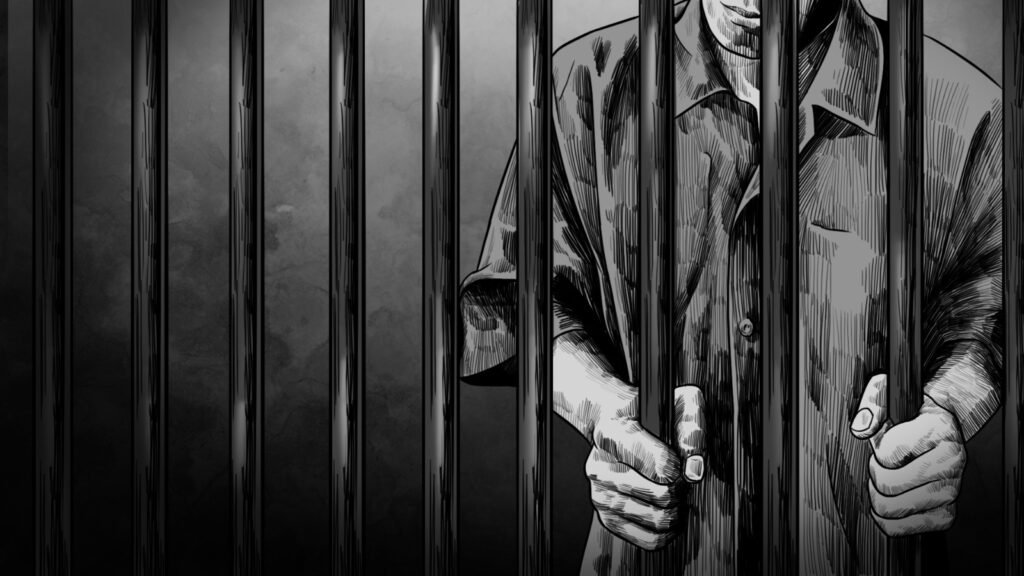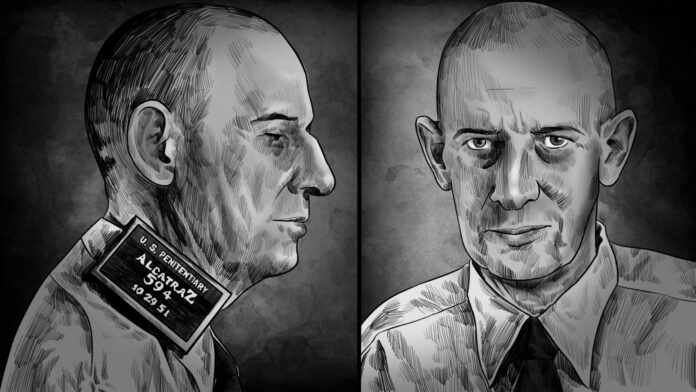There is no doubt that the place where you were born has a significant impact on the course of your life. However, being born in one of the world’s most powerful and advanced countries does not necessarily guarantee a decent life. Robert Franklin Stroud, known as the Birdman of Alcatraz, is a prime example of this.
Stroud was born in 1890 in Seattle, the largest city in Washington State on the west coast of the United States. His father was an alcoholic, subjecting him to severe violence and leading to a harsh and unstable childhood. He left school at a very young age, having only completed the third grade before running away from home at 13. This escape marked the beginning of a life filled with delinquency.
After leaving his parents’ home, Stroud struggled to find stability and tried various jobs during his teenage years, including working as a longshoreman in Seattle, but he was unable to secure a stable income.
In 1908, at the age of 18, he decided to move to Cordova, Alaska, in search of work in the railroad construction industry. The gold rush in Alaska and the nearby Yukon Territory had attracted thousands of miners and settlers, but the hard work and his morphine addiction turned his life into a nightmare.
He then met Kitty, a prostitute about twenty years older than him, and they quickly moved in together in Juneau, where he worked as her pimp. His relationship with her was a mix of love, maternal care, and financial dependence.
First murder
In 1909, Kitty was beaten and raped by a customer who was a bartender and did not pay her. Stroud confronted him, fought with him, and shot him dead.
Initially, Stroud believed that his mother would not leave him without hiring a good lawyer and thought that if he confessed to the charge of premeditated murder, he might receive a reduced sentence of a few years. A lawyer convinced him to plead guilty to manslaughter, as similar cases had resulted in three-year sentences. However, Judge Cushman, who had recently taken over temporarily in Alaska, declared his intention to be tough on violent crime offenders to increase respect for the law in the state. This led him to make an example of Stroud, despite his youth, and sentenced him to twelve years in prison.
Since Alaska was a federal territory, the sentence had to be served in a federal prison, which was McNeil Island Penitentiary in Washington State, known as Puget Sound.
Thus began Stroud’s career as a federal inmate. During his imprisonment, his rebellious and complex personality began to emerge. He was difficult to handle, and his relationship with the authorities was always tense and violent. While at McNeil, he was involved in several violent incidents that added more prison time to his original sentence.
For example, he once assaulted a man working at the prison infirmary when he tried to force him to give him morphine, adding six months to his sentence. This was just the beginning of a series of aggressive behaviors that made Stroud an unwanted inmate, and he was involved in a fight with another inmate over food that nearly resulted in the other’s death, adding another six months to his sentence.
Meanwhile, his mother, who had moved to live near the prison, visited him regularly and provided moral support, but even this support was not enough to calm his violent and rebellious nature.
Due to Stroud’s increasing problems at McNeil, the authorities decided to transfer him to Leavenworth Prison in Kansas, known for its strictness.

Second murder
Stroud somewhat adapted to his new prison environment, and the only thing he looked forward to was visits from his mother from Alaska. However, he angered a guard who would provoke him at every opportunity.
His mother wrote that she would visit him, and the day before the visit, the guard wrote a disciplinary report about a minor infraction committed by Stroud, which meant he would not be able to see his mother.
On the morning of the visit, Stroud approached the guard as he was entering the dining hall and politely asked him not to file the disciplinary report because his mother was coming. The guard mocked him and said he did not care where she came from and that he certainly would not see her this time.
A friend advised him that the minor infraction would not prevent him from seeing his mother. On that morning, Stroud tried again to talk to the guard, but the guard told him that leaving the line without permission resulted in another disciplinary report.
Stroud was very upset and did not eat much of the food on his tray. The guard, who disliked Stroud, noticed this and, after inspecting the tray, saw some leftover fruit. The guard smiled and told him another report would be written against him.
Stroud slyly nudged a friend sitting across from him at the table and found a knife made from eating utensils under the table. He hid the knife in his pants.
As he left the dining hall, he approached the guard to ask him to stop writing the report. The guard told him that leaving the line without permission meant another disciplinary report. Stroud, enraged, pulled the knife from his shirt and, in front of more than a thousand inmates and guards, stabbed the man to death.
Stroud’s conviction was a foregone conclusion, and the court saw no mitigating circumstances. He was sentenced to death in 1920.
His mother traveled to Washington and met with President Woodrow Wilson’s wife, asking her as a mother to intervene to save her son. This intervention worked, and just eight days before his execution, his sentence was commuted to life imprisonment at Leavenworth Prison in Kansas.
Birds of the Prison and the Dream of Freedom
At Leavenworth Prison, Stroud developed an interest in the birds he found in the prison yard and was granted permission to bring some canaries to him. This transition marked a new turning point in his life, leading him to care for and treat birds.
Initially, Stroud’s interest in birds was a way to pass time in prison, but it quickly became a genuine passion and a reason to live. Stroud collected around 300 birds and began breeding them and sending them outside the prison to be sold. During his imprisonment, Stroud wrote two books: Diseases of Canaries (1933) and Stroud’s Digest on the Diseases of Birds (1943), which were considered valuable reference works by ornithologists and breeders.

The Infamous Alcatraz Prison
Over time, prison officials grew frustrated with Stroud’s activities and the popularity he achieved outside the prison. They attempted to transfer him from Leavenworth, but he outwitted them by arranging a proxy marriage with one of his supporters, as Kansas law prohibited the transfer of married prisoners. This infuriated the prison warden, who did not allow him to correspond with his wife.
In late 1942, prison officials found a way to rid themselves of Stroud after discovering that he was using birdcages to send unauthorized messages outside the prison. He was transferred to the notorious Alcatraz Prison and was deprived of his birds forever.
He was particularly angry about the fact that his window, which previously had clear glass, was replaced with thick, opaque glass, ruining his view of San Francisco Bay.
Officials claimed that the sea air could corrode the window frames, but years later, in 1975, it was discovered that many other rooms had clear glass, and they could have given him this simple thing, his only window to the outside world.
Alcatraz Prison was built on a rocky island a few kilometers from the coast of San Francisco, with its scenic views and enchanting nighttime lights, making the prisoners feel even more deprived and regretful of what they saw on the very nearby horizon.
The island was named Alcatraz, derived from a Spanish word for a seabird that frequents the island. The prison was closed a year after Stroud’s death and became a tourist attraction, drawing millions of visitors.
The last person to leave the prison was William Baker, who later became a tour guide, giving tours of the prison and distributing his book Alcatraz 1259 (2013), which mentioned his impressions of Stroud in some chapters.
Actor Burt Lancaster portrayed Stroud in the film Birdman of Alcatraz (1962), for which he won the Best Foreign Actor award from the British Academy of Film and Television Arts (BAFTA) and was nominated for an Oscar.
In a television interview years after Stroud’s death, Lancaster said that Stroud passed away about a year after his visit to him in the hospital before his death and that he did not see the film, as no one was allowed to see Stroud except his lawyer. After the film was released, Senator Edward Long arranged a meeting with Stroud, and Lancaster went to see him in the hospital in Springfield, Missouri. He remembered Stroud as a man in his early seventies, still vibrant and full of life but, of course, bitter about the American penal system that failed to recognize his unique talents. Lancaster expressed his stance against prison sentences without rehabilitation, as they achieve little except bitterness, hatred, and the repetition of crimes.
Stroud died on November 21, 1963, at the age of 73, after spending more than two-thirds of his life in prison, including 42 years in solitary confinement. He was buried next to his mother, who had passed away a quarter-century earlier, in Massac County, Illinois.
Despite his fame, no one paid much attention to his death, as the next day President John F. Kennedy was assassinated, overshadowing any other news.




